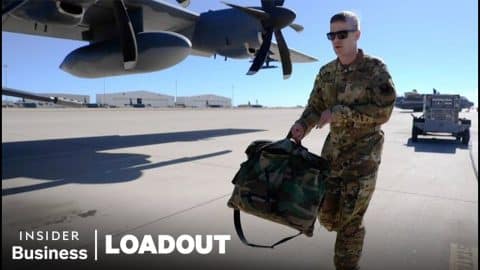
YouTuber / Insider Business
Major Riley Feeney, an AC-130J evaluator pilot, shows us everything he brings with him on flights.

First and foremost is the helmet. Pilots utilize this to communicate on the aircraft as well as provide oxygen in the air.
It also has a lip light so they can look at their kneeboard easily at night. If that wasn’t enough, they also fly with finger lights, which act the same way as lip lights.

The goggles can be used to look out of the side heads-up display and see the projections it puts on the ground. By using this, they are able to see the friendly and enemy forces at night – an incredible addition to the pilot’s situational awareness.
These are also helpful when spotting tracer fire from 50 miles away, which the aircraft’s sensors might not pick up.

It’s basically an iPad that’s utilized to contain all of the pilot’s pubs (publications) and other things they need to do for instrument approaches.
“If I take this with me, I’m able to go pretty much anywhere in the world.”
According to him, the Air Force has been using iPads as early as 2012!

This one is the “fancy” model that comes with noise canceling. They’re typically used for day flying or during pilot proficiency training.
It also serves as a redundant device they can use to still have communication within the aircraft if the headset in the helmet fails.

“I’ve been flying with a kneeboard since I’ve been going through pilot training.”
They keep all of their flight information, from the weather information down to the tactical scenarios that are developing in a restricted operating zone.
“You wouldn’t be a pilot in the United States Air Force if you didn’t have some set of cool glasses.”

Maj. Feeney’s sunglasses are Oakleys, which are an approved form of glasses. They get the sunglasses from a resource advisor in order to fly with them.
“They’ve become somewhat of a good-luck charm for me.”

Dog tags should always be with them so they can get identified if things get a little bit dicey.
“I’ve spent a long career listening to very loud sounds”

The helmet doesn’t have its own noise-canceling feature, so pilots tend to go for foamy earplugs to save their hearing. These are also used during pre-flight checks since the sound of a running Auxiliary Power Unit is not a pleasant sound to hear every time.
“As with anything in life, you should also stay well hydrated.”

Maj. Feeney always carries his issued Hydro Flask, which has stickers of all the squadrons he’s been a part of in his life.